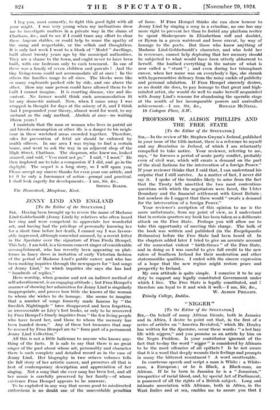PROFESSOR W. ALISON PHILLIPS AND THE FREE STATE
[To the Editor of the SPECTATOR.] SIR,—In the review of Mr. Stephen Gwynn's Ireland, published in your issue of the 15th instant, there is a reference to myself and my Revolution in Ireland, of which I am reluctantly compelled to take notice. Your reviewer, referring to me, says, " he foresees a period of acute party conflict, probably even of civil war, which will create a demand on the part of the rival factions for the intervention of a foreign Power." If your reviewer thinks that I said that, I can understand his surprise that I still survive. As a matter of fact, I never did say it. I spoke of the troubles likely to arise from the fact that the Treaty left unsettled the two most contentious questions with which the negotiators were faced, the Ulster Boundary and the financial settlement with Great Britain ; but nowhere do I suggest that these would " create a demand for the intervention of a foreign Power."
Your reviewer's ascription of this opinion to me is the more unfortunate, from my point of view, as I. understand that in certain quarters my book has been taken as a deliberate attack on the Free State. Perhaps you will allow me to take this opportunity of meeting this charge. The bulk of the book was written and published (in the Encyclopaedia Britannica) before the Free State had been heard of. In the chapters added later I tried to give an accurate account of the somewhat violent " birth-throes " of the Free State, and in doing so I was careful to give full credit to the new rulers of Southern Ireland for their moderation and other statesmanlike qualities. I ended with the sincere expression of a hope that the new regime might restore peace and prosperity to Ireland.
My own attitude is quite simple. I conceive it to be my duty to support any legally constituted Government under which I live. The Free State is legally constituted, and T. therefore am loyal to it and wish it well.—I am, Sir, &c.,
W. ALISON PHILLIPS.
Trinity College, Dublin.


























































 Previous page
Previous page